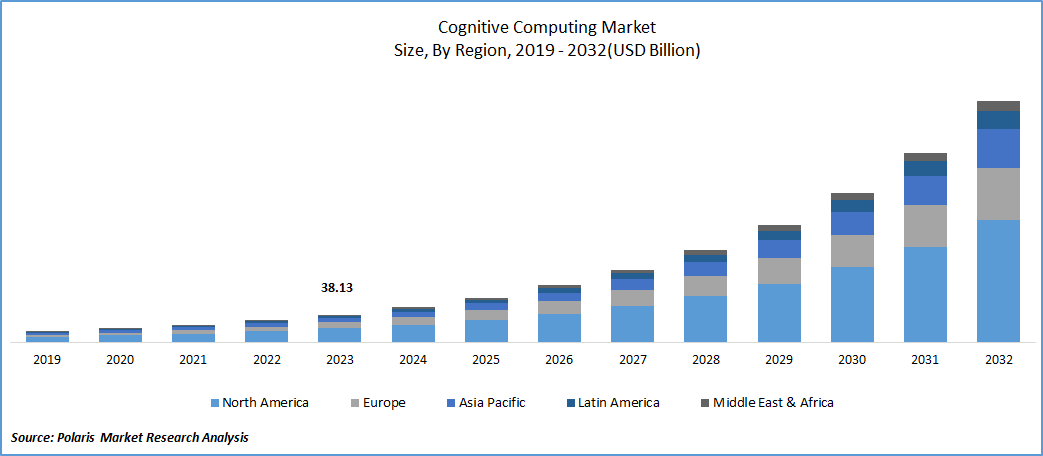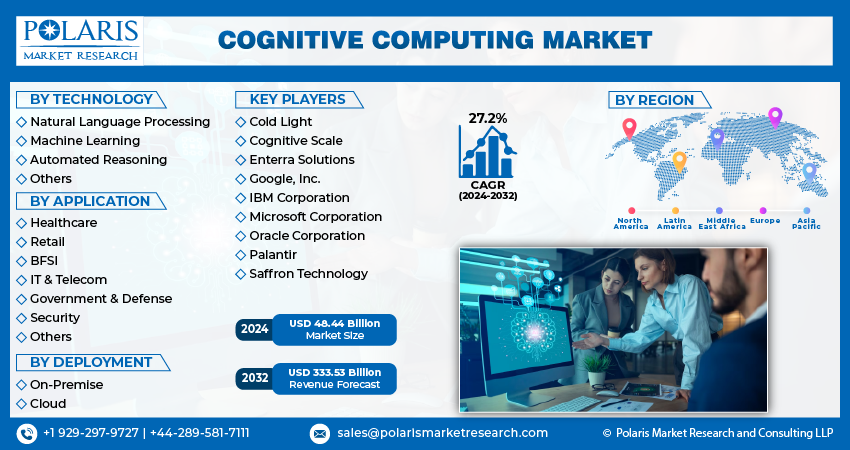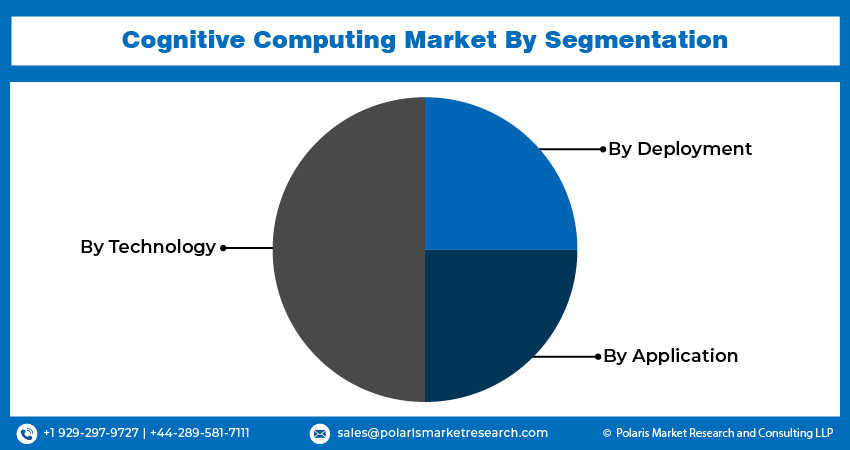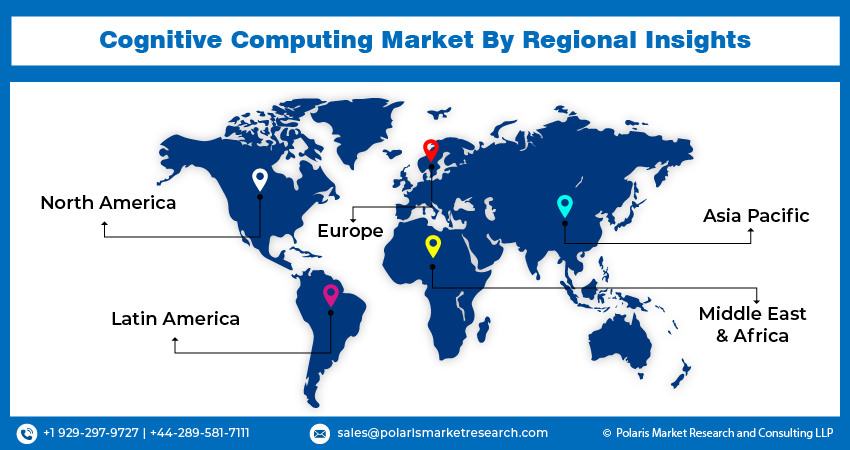
Cognitive Computing Market Share, Size, Trends & Industry Analysis Report
By Technology (Natural Language Processing, Machine Learning, Automated Reasoning, Others); By Deployment; By Application; By Region; Segment Forecast, 2025 - 2034
- Published Date:May-2025
- Pages: 116
- Format: PDF
- Report ID: PM1458
- Base Year: 2024
- Historical Data: 2020-2023
The global cognitive computing market was valued at USD 41.8 billion in 2024 and is forecasted to grow at a CAGR of 26.80% from 2025 to 2034. The market is expanding due to rapid advancements in AI, machine learning, and natural language processing.
Cognitive computing is the use of reasoning, language processing, machine learning platforms, and human-like capabilities to improve traditional computing, allowing for better problem-solving and data analysis. A computer system's intelligence grows as it learns patterns and behaviors, allowing it to handle complex decision-making processes.
The advancement of the Internet of Things (IoT) technology has played a critical role in driving market growth, providing numerous applications in the development of interactive software platforms. Cognitive computing is a technological foundation based on signal processing and artificial intelligence principles. Natural language processing (NLP) is widely used because of its inherent ability to handle natural language interactions. The widespread use of automated reasoning, big data, machine learning, artificial intelligence, and random logic has advanced the field of data science significantly.
The growing demand for cognitive systems within large enterprises is expected to spread to small and medium-sized businesses, owing to the prevalence of cloud services. The cost-effectiveness of cloud-based deployment facilitates the widespread adoption of cognitive computing in organizations, contributing to increased overall demand for cloud professional services.

To Understand More About this Research: Request a Free Sample Report
Despite economic challenges, sectors like finance and healthcare accelerated adoption, focusing on automation and data analytics to navigate the crisis efficiently. As businesses adapted to remote operations, the market witnessed a surge in demand for cognitive computing platforms that enhance decision-making and operational efficiency. Looking ahead, the market is poised for recovery and growth as organizations prioritize digital transformation and resilience strategies post-pandemic.
Governments and organizations have invested in artificial intelligence (AI), machine learning (ML), cognitive technology, the Internet of Things (IoT), and cloud computing. These technological advancements are invaluable for early disease detection, diagnostic capabilities, environmental monitoring, risk mitigation in economic crises, and the analysis of large data sets. Primarily, industry leaders are focusing their efforts on introducing novel products aimed at improving customer experiences. Natural language processing is a type of artificial intelligence that aims to give computers the ability to understand and analyze human language. This field is concerned with the analysis of text, with the goal of gaining valuable insights by extracting the inherent meaning from words and sentences. NLP technology has been instrumental in developing intelligent applications capable of comprehending, processing, and responding to natural language inquiries.
Natural language processing (NLP) is reshaping cognitive computing. It entails using advanced computer models to simulate human brain behavior and thought processes. This rapidly advancing technology is becoming increasingly important in the development of systems capable of comprehending user inquiries and providing precise and meaningful responses.
Industry Dynamics
Growth Drivers
Improvement in Flexible Technology will Drive the Growth of the Market
The advancement in flexible technology will drive the growth of the cognitive computing market. Companies across the world are actively looking for ways to derive meaningful insights from the vast reservoir of digital data. Businesses are investigating various enabling technologies to analyze dark data as the volume of digital data continues to grow. As a result, there is an increasing demand for systems capable of processing and interpreting digital information, facilitating the extraction of valuable insights. The use of cognitive technology in research and development (R&D) organizations has increased dramatically. This is due to its ability to anticipate and provide solutions for specific situations, which is a key driver fueling the market's growth.
Cognitive computing systems are developed using machine learning and natural language processing (NLP) algorithms to analyze, predict, and draw conclusions about situations. For instance, IBM Watson utilizes deep learning algorithms and neural networks to process information based on data sets. Additionally, it has gained immense momentum recently as extensive research and development efforts have significantly improved the performance of these technologies. Moreover, commercial investments in these technologies are increasing the sales and deployment of cognitive computing applications, positively impacting the market growth.

Report Segmentation
The cognitive computing market is primarily segmented based on technology, deployment, application, and region.
|
By Technology |
By Deployment |
By Application |
By Region |
|
|
|
|
To Understand the Scope of this Report: Speak to Analyst
By Technology Analysis
The Natural Language Processing Segment Accounted for the Largest Revenue Share in 2024
In 2024, the natural language processing segment accounted for the largest revenue share. Natural language processing (NLP) is the ability of a computer to comprehend human language, with significant challenges in the natural learning process centered on both understanding and generating human language. NLP is expanding and being implemented in a variety of domains, including e-commerce, web services, IT, telecommunications, and healthcare. Through the incorporation of NLP software solutions, its integration into these sectors aims to improve operational processes and elevate customer experiences. Despite the continued adoption of this technology in healthcare, there is an anticipation of rapid growth in technological innovations for software solutions across a wide range of other applications.
On the other hand, the machine learning technology segment is anticipated to witness the fastest growth during the forecast period. Due to the growing demand for improved human interaction, cognitive computing technology platforms are expected to gain traction in the field of machine learning, particularly in adaptive and interactive learning. Experts predict a surge in interest in machine learning and natural language processing (NLP) to improve translation and interpretation tools. Furthermore, participants are preparing to inquire about opportunities for identifying business prospects and evaluating emerging patterns.
By Deployment Analysis
The Cloud Deployment Segment Accounted for the Highest Market Share During the Forecast Period
The cloud deployment segment accounted for the highest market share during the forecast period. Recent improvements in data storage, such as the integration of cloud storage facilities and the progression of tailored cloud solutions such as private and public clouds, have aided in overall expansion. Furthermore, the growing volume of data has compelled businesses and organizations to increasingly rely on cloud solutions. The adoption of cloud solutions provides stakeholders with numerous opportunities to reduce the costs associated with cognitive computing.
On the other hand, the on-premise segment is anticipated to experience the fastest growth during the forecast period. This on-premises deployment entails installing and running software on a customer's internal server and computing infrastructure, ensuring security and reliability because the software is located on the organization's premises. Despite being more expensive than cloud-based alternatives, on-premises solutions are preferred for their dependability. The higher cost is attributed to the requirement for IT infrastructure, including servers and the use of the organization's native computing resources.

Regional Insights
North America Accounted for the Largest Market Share in 2024
In 2024, North America cognitive computing market accounted for the largest share, owing to rising internet penetration, robust IT infrastructure, widespread robotics adoption, advances in healthcare, and the rapid integration into various business processes. The World Bank reported that over 92% of North Americans had internet access, laying the groundwork for the growth across a wide range of industries, including fashion and retail, healthcare, manufacturing, transportation, and others. With ongoing economic developments and rising consumer spending power, the market is anticipated to grow further in the coming years.
Europe cognitive computing market accounted for the fastest growth over the forecast period. Due to a significant increase in demand across diverse sectors such as healthcare, banking and finance, research and education, and with government support, European nations are improving their IT infrastructure to remain competitive in the rapidly evolving technological landscape. For instance, the Science and Technology Facilities Council (STFC), a publicly funded research council, has played a critical role in positioning the region at the forefront of international science and technology endeavors. The council's contributions have been critical in addressing a variety of societal challenges, including advances in research and education, global energy and power, and efforts to combat climate change.

Key Market Players & Competitive Insights
The cognitive computing market is characterized by intense competition, with established players relying on advanced technology, high-quality products, and a strong brand image to drive revenue growth. These companies employ various strategies such as research and development, mergers and acquisitions, and technological innovations to expand their product portfolios and maintain a competitive edge.
Some of the major players operating in the global cognitive computing market include:
- Cold Light
- Cognitive Scale
- Enterra Solutions
- Google, Inc.
- IBM Corporation
- Microsoft Corporation
- Oracle Corporation
- Palantir
- Saffron Technology
Recent Developments
- In February 2024, Mphasis launched DeepInsights Doc AI, a generative AI-powered document processing platform. The solution helps enterprises extract context-specific information from documents and integrates it with IT systems to generate actionable insights, enhancing business process efficiency.
- In March 2023, Sanctuary AI, a company dedicated to advancing general-purpose robotics and developing human-like intelligence, partnered with the Canadian Tire Corporation. The new partnership represents a significant step forward in providing general-purpose robots with unprecedented human-like intelligence. The first successful deployment at a commercial customer facility emphasizes the significance of this accomplishment.
- In May 2021, SAP partnered with Google Cloud with the objective of broadening SAP's capabilities in machine learning and artificial intelligence. This partnership also involves the incorporation of Google Cloud's cutting-edge technologies into SAP's suite of business applications.
- In March 2021, Microsoft acquired Nuance Communications, a prominent provider of healthcare-focused AI and speech technology solutions.
Cognitive Computing Market Report Scope
|
Report Attributes |
Details |
|
Market size value in 2025 |
USD 53.0 billion |
|
Revenue forecast in 2034 |
USD 427.8 billion |
|
CAGR |
26.80% from 2025 – 2034 |
|
Base year |
2024 |
|
Historical data |
2020 – 2023 |
|
Forecast period |
2025 – 2034 |
|
Quantitative units |
Revenue in USD billion and CAGR from 2025 to 2034 |
|
Segments Covered |
By Technology, By Deployment, By Application, By Region |
|
Regional scope |
North America, Europe, Asia Pacific, Latin America, Middle East & Africa |
|
Customization |
Report customization as per your requirements with respect to countries, region, and segmentation |
FAQ's
The cognitive computing market size is estimated to be worth USD 427.8 billion by 2034.
The global key market players include 3M, Cold Light, Cognitive Scale, Enterra Solutions, and Google, Inc.
The North America region contributes notably towards the cognitive computing market growth.
The global cognitive computing market is expected to grow at a CAGR of 26.80% during the forecast period.
The cognitive computing market report covering key segments are technology, deployment, application and region.
